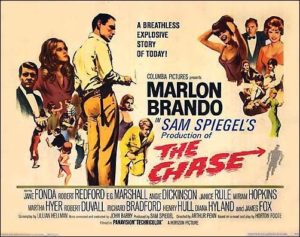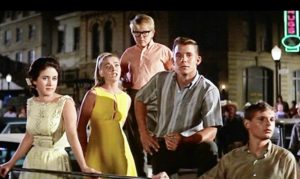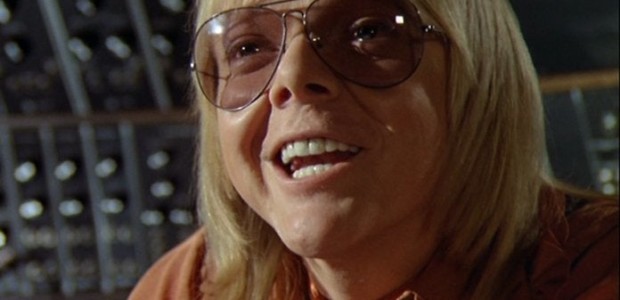PHANTOM OF THE PARADISE isn’t the kind of film a major studio—particularly 20th Century Fox—would release today. In hindsight, it was destined to become a cult classic:. The offbeat 1974 musical was a cynical satire of the rock ‘n’ roll industry that combined elements of horror, and slapstick comedy with THE PHANTOM OF THE OPERA and THE PICTURE OF DORIAN GRAY, setting the stage for all the other genre-based musicals that would make their way to the big screen. Tasked with composing the music for this rock opus was Paul Williams, already well-known for cranking out hits for Three Dog Night and The Carpenters in the early ’70s. PHANTOM OF THE PARADISE turns 45 this year and a new documentary that held its world premiere at the Fantasia Film Festival, THE PHANTOM OF WINNIPEG, explores the film’s phenomenal success in the small Canadian city—where it outgrossed JAWS, despite being ignored everywhere else. Mike Vanderbilt sat down with Williams on the eve of PHANTOM OF THE PARADISE‘s 45th anniversary to discuss his songwriting career and what inspired him in creating the other cult-classic rock ‘n’ roll musical of the ’70s.
****
Daily Grindhouse: Thanks for giving us some time today, Mr. Williams.
Paul Williams: First of all, [it’s great to see] just this many people in one place that love the film that are really devoted to the film. But also, the fans of PHANTOM OF THE PARADISE have just basically given that film life. I mean, if it had been even a minor hit, it would be gone by now. But because it was a word of mouth situation and people that just fell in love with it and then they grabbed people and made them watch it and some of them, the best part of the trip has been, earlier today interview with Nightmare On Film Street, and they’d seen the film that for the first time In January.
DG: Were you aware of Richard O’Brien’s stage production of The Rocky Horror Show while you were writing Phantom?
PW: Not really, no. You know, the picture wasn’t out yet. It was so much fun. It’s so good. There’s a lot of theaters that do midnight screenings of the two of them together.
DG: It is a perfect double feature.
PW: Yeah, exactly. So I was not aware of it but, I certainly am now, and I’m a fan.
DG: You tried to make your bones as an actor first before you get into songwriting. I had seen an interview where you explained that after getting cut out of a movie, you picked up a guitar and just started “doodling.”

PW: What happened was, I was doing a movie called THE CHASE with Marlon Brando, Robert Redford, Robert Duvall, and Jane Fonda; an amazing cast. And there were four of us teenagers, whose story was going to develop…and it never really developed very much. Most of the time we’re watching Marlon Brando work—which, for an actor, that’s like acting school. I think when the picture came out, I had two lines in it, but I shared a dressing room with a kid named Mark Scene who had a beautiful Martin Guitar and I picked it up. He said, “don’t touch that, that’s a Martin guitar.” So I went out and I bought a cheap little guitar.
DG: Do you remember the brand?
PW: No, but it was probably as close to being a kids’ guitar as you can get.
DG: Had you ever played before?
PW: No. So I’m trying to struggle to find the chords and all. I didn’t even know they were called A, E, and D. I was an absolute newbie. I’m looking and trying to find the chords and all that, and we’re shooting the scene where we’ve set fire to this junkyard and Robert Redford’s character Bubba is hiding in the junkyard.
And I’m sitting on the steps of his little ugly trailer that they’ve got the two of us in and looking at all that. And just on my own, for my own amusement, I’m playing the guitar and singing, “come out wherever you are” and Robert Duval walks by and he goes, “what’s that?” I said, “It’s a guitar, I just bought it.” And he asks “No, what were you playing?” And I said, “I just made it up.” What went through my head was “I’m in trouble, messing around on the set.” He said, “come with me.” Now I’m really like “oh fuck, I’m in trouble.”
DG: How old were you at this point?
PW: I was probably 24, playing a 15-year-old. He walks me over to Arthur Penn—huge director, he had done BONNIE AND CLYDE—and this was a huge picture. Duval says, “show him.” And I said, “it’s a guitar. He says, “not the guitar, show him what you were singing.” I sang the song and Arthur Penn went ” stand over here by the fence, light him up, guys. They popped the lights up there, they brought the camera around and he goes “do it.” I sing “Bubba, Bubba, bubba, come out wherever you are,” and he put it in the movie. All I wanted was to be an actor! And it’s like the universe says, “like you’re going to go through said really interesting life to get into it. You’re going to have the opportunity to act.” To have the very first thing that ever came out of me as a songwriter in a big-budget film, it was a billboard. Hal Ashley’s wife told me, “you have to watch for billboards in your life.”

I almost drowned trying to steal booze from a boat when I was about 15. I swam over to a boat, climbed up on with some other guys. We raided the boat, took the bottles of booze, tried to swim back with the bottles and we almost drowned. She said, “there’s a billboard, you were 15 years old and the universe was telling you that alcohol will drown you.” Then I’m 49 years old—I didn’t have the best childhood, but I had the longest childhood—and I quit drinking. I finally got the message, and I’m 29 years sober now. We get billboards and that was a billboard for me. This is your path.
DG: Do you write on guitar or piano? What’s your process?
PW: I write it in my head. I can hear a song fully in my head. I get the lyrics together with a melody in my mind, and then I go and I find the chords at a piano. Then I go to my music director and show it to him and he makes it sound like it was written by an adult. That’s the only part of songwriting that feels like a job, trying to find the chords, because it’s frustrating sometimes. There’s a passing chord that I know is going to make this so beautiful, and I could hear it in my head, but I can’t find it.
DG: I know exactly what you’re talking about. Usually it’s the most obvious one.
PW: Here’s what happens to me. I’ll go to Chris Caswell, who’s been my music director for years. I’ll say “buddy, I hear this in my head” and he’ll play something and I’ll go, excuse my language, “fuck you! That’s exactly it!” And he says “well, you know it’s an augmented ninth or whatever.” Sometimes, as you said, the thing to do is to return to the original chord, or to stay on that chord longer than you were going to.
DG: You’ve worked with several notable session musicians in your career: who was in your band for PHANTOM?
PW: Gary Mallaber was on drums, David Garland on keyboard…it was pretty much my road band; they all played on BUGSY MALONE and the Muppet stuff. On PHANTOM I used some great backup singers, like Archie Hahn who sings “Goodbye, Eddie, Goodbye” was the voice of Bugsy Malone. I’d take my guys with me; bring my friends around. Jeffrey Comanor who sings “Faust” and I were buds forever. We were at A&M records for years. There was a sense of family.
DG: There were several drafts of the PHANTOM script. When did you come onto the project, and did you have any ideas or concepts for songs that ended up getting cut because of the changes to the script?
PW: When it first started out. it was titled PHANTOM OF THE FILLMORE. The biggest change was that in the original script, Beef was going to die in the shower. And I don’t know exactly how it evolved. There was probably a time in my life when I would have taken solid credit for it, but it was either Brian or me. But the idea of theatrical violence fascinated me; it’s 1974, and we’re eating our TV dinners and watching footage from Vietnam. The line between entertainment and news is beginning to disappear. My favorite line in the whole movie is “an assassination live on coast-to-coast television? That’s entertainment!”
To me, the heart of the picture is the kids have seen so much theatrical violence that when they see the actual killing, they don’t realize it’s real. That’s the heart of the movie for me. That’s the social message in the movie. It’s one of the reasons why the picture is still relevant right now with reality television and with all that nastiness, all the angry cynical shit.
DG: There’s a lot of cynicism in the PHANTOM soundtrack. Was that more of your skill as a songwriter or did you have to go somewhere deep inside yourself? I tell people all the time that I want “The Hell Of It” to play at my funeral as they’re lowering me into the ground.
PW: “The Hell Of It” was written for a funeral scene that was cut out of the film. After Beef dies, his fans assemble in a gray cemetery, snow on the ground, an open grave with a casket in it, and a bunch of microphones. You follow one of the microphone cables back to a black hearse and go inside to reveal that Swan is recording the funeral. And then a little girl runs forward and jumps on the coffin and starts auditioning for Swan with a tap dance. The scene got cut, but that’s why I did an homage to Nino Rota, the guy who scored all the Fellini movies, with the end of the song.
DG: I just watched you perform it on the Brady Brady Bunch Hour from 1977.
PW: I was such a slut. You put me on a couch and in front of a camera, I was there. There was a documentary called PAUL WILLIAMS STILL ALIVE and it’s hard for me to watch because there’s footage of me just whole loaded out of my gills, arrogant, dead-eyed…
DG: You always looked like you were having fun, though.
PW: You know what? I was having fun. But I also was so full of self, and you see it. When you get to that point where the drugs began to really just take over, you lose touch with reality. I think the reason why my songs were successful is because they weren’t written to be pop or whatever. They were written just from what I felt. Most of them were born in the center of my chest.
DG: You said in an interview that you were surprised Brian de Palma picked you to do this. Were you aware of Brian De Palma’s work before PHANTOM, and who did you listen to inspire you in writing the heavier, glammier numbers for the film?
PW: I was talking to Nancy Munoz about the fact that I’ve never been able to enjoy other people’s music because if it’s great and inspires me, I want to go and run. My favorite band ever was The Original Delaney & Bonnie & Friends. They had a gospel rock sound but featured Leon Russell, Eric Clapton, and other legends. That band that became Joe Cocker’s band on the Mad Dogs & Englishmen album.
Instead of trying to write hit songs for a movie, what I do that a lot of songwriters don’t do is, I don’t try to write pop songs, I tried to write the character and move the story forward. So everything was about moving the story forward and I was just so comfortable with my guys.
DG: Did that make it easier for you, having the beginning, middle, and end of a story to write for?
PW: That’s the gift of writing for film: you’ve got a script that tells you where you’re going. When we started, Brian wanted Sha Na Na to play the Juicy Fruits. I went to him and said, “I want my guys. I want the same band to make the music all the way through. Let’s watch The Juicy Fruits morph into The Undead.” They became representational of the purely commercial side of the music business.
DG: Would you say the PHANTOM soundtrack is a very personal record to you?
PW: In the sense that emotional tools you’re writing with are what you’ve experienced yourself.
DG: Do you see a little bit of yourself in Winslow Leach? Or maybe more so Swan?
PW: Actually, a little bit of both. I think that all of us have felt like an outsider. You’ll notice that most people that are creative and have a powerful passion have probably felt like outsiders. In the song “Somebody Super Like You,” there’s the line “heroes have got to be tall.” I threw that in as little digs towards myself. Or “a Hollywood smile on a perfect profile;” I had just had my teeth fixed. I had all brand new caps that I was showing off at every turn.
—MIKE VANDERBILT
- Vampsploitation - January 15, 2018
- Hiatussploitation - December 5, 2017
- Live From Fantastic Fest, 2017 - September 28, 2017
Tags: brian de palma, Paul Williams, Phantom Of The Paradise, Rocktober, Rocktoberfest


thanks for this interview I loved learning that he’s shy around great musicians as well, or inspired to the point of sprinting.